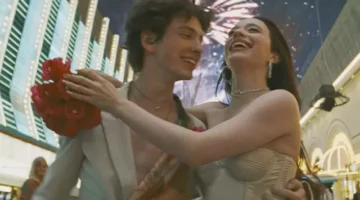Tropic Sprockets
The Disappearance of Eleanor Rigby
BY IAN BROCKWA
Ned Benson’s debut film “The Disappearance of Eleanor Rigby,” (originally designed with three alternate perspectives) is an unflinching window into both a heaven and a hell of loss, or more specifically, the emotional experience of romance and intimacy.
In this film, love is twined in adventure and tragedy.
James McAvoy is Connor, a restaurateur. Jessica Chastain is an aspiring anthropologist with dreams of a PhD. At the start, they are Romeo-eyed and Juliet-flamed as one. They get married.
Then an accident happens. One is left to make up his/her own mind as to what precisely happened, yet it quickly becomes clear that it was devastating and life changing, involving the sudden death of their infant son.
Eleanor is taking a walk in New York. Leaning over the guardrail, she hurls herself into the Hudson. Connor visits in the hospital.
Eleanor vanishes. Months pass. Life goes on. Conner has his own cafe. A bar and grill with a mediocre following.
Sadly, he has time on his hands and he cannot stop thinking of his lost love.
Connor’s chef (Bill Hader) sees Eleanor on the street. Connor gets the idea to pursue her.
Chastain is excellent as is McAvoy. The two actors are the adhesive that holds this film together, smoothing over what might have been a bit too geometric, lugubrious and somber. This is a true ensemble narrative and these two especially give the film tension and fire. As a pair, they are unavoidable and compelling.
Some of the vignettes do appear dry and flat, yet this clinical condition is alleviated by some quick cutting in flashback which makes it satisfyingly like Richard Brooks’ “Looking for Mr. Goodbar.”
The doltish father (William Hurt) doesn’t carry much heart; he is a sad sack. The mother (Isabelle Huppert) is petty and uninteresting. We have seen these identical parent roles stuck in melodramatic molasses before. Ditto for Connor’s monotone father (Ciarán Hinds), owning a famous restaurant long past his prime with no real zest or worry.
An exception is a sarcastic and earthy professor played by Viola Davis.
The thrill of the story is in McAvoy’s droop-eyed face, Picasso-like with tears, coupled with Chastain’s lost Ophelia shock that sometimes hardens to a gray metal.
“The Disappearance of Eleanor Rigby” focuses more on the sadness of loss rather than love found, but it is a film that is often first rate in its minimalism and melancholy.
In one long shot showing Cooper Union, the beams of stainless steel become a pair of scissors that can impale a heart, and also blanch a Cupid’s face into shards of silver ice.
While the film borrows heavily in tone from 2010’s “Blue Valentine” and the work of the late director John Cassavetes, it is impossible to look away. And it is a credit to Ned Benson that under his lens the audience is forced to make a conclusion as to what happened and who, if anyone, is most at fault.
The final scene of “The Disappearance of Eleanor Rigby is a film in itself with as much eerie apprehension and haunt as anything I have recently seen.
My Old Lady
Noted playwright Israel Horovitz (Author, Author) directs an adaptation of his play “My Old Lady” starring the iconic Maggie Smith and Kevin Kline. The story of a man (Kevin Kline) spiritually at sea, starts out as a farce involving an older woman who comes with a spacious Parisian apartment complex, and grows more intense despite some over the top melodrama that gives mixed results.
A down and out Mathias (Kline) hopes to get back on his feet financially by selling his inherited Paris property. Mathilde (Smith) is the headstrong lady who has a lifetime occupancy on the property. To put wrenches into an already unattractive economic situation, Mathilde’s off-putting daughter Chloe (Kirsten Scott Thomas) also lives in residence.
Kevin Kline does wonderfully with some zany antics in the mode of his performance as Otto in “A Fish Called Wanda” with plenty of sarcasm and exaggerated hyperbole in stubbornness. Mathias is also quirkily self-deprecating and offhand, which gives his role a more believable flavor. Maggie Smith is predictably entertaining too, as a very opinionated and zesty older lady although this is no great stretch for her.
What starts as a madcap dilemma quickly deepens into a boozy Sturm und Drang when it is revealed that Mathilde had a near lifetime romance with Mathias’s father. Kline is very watchable and endlessly smooth as the snarky schemer quick to pull the wool over Mathilde’s eyes. With such moments, the film almost reaches the fun found in Frank Oz’s “Dirty Rotten Scoundrels.” Provocative also are Mathias’s maudlin zingers when he blames Mathilde for his family drama.
During the height of the yelling, however, “My Old Lady” feels like “August: Osage County” with Edward Albee waiting off camera. Kline is much better as a gonzo alliterative punster than a indignant sad sack. The shifts in emotional color make the film seem like two narratives in one, and the farcical segments hold more gusto than the ones with heavy pathos.
Given that the playwright Horovitz was close friends with Samuel Beckett (there is a quote by famed Beckett in the film), one wishes for a less formulaic narrative that owes more to the genre of romantic comedy than a character study. The conventions of hugging and kissing at the finish of some scenes make this cinematic lunch into a small salade verte rather than a satisfying nicoise.
That said, you will not be bored. There is enough ramble in Kline and Smith to keep you on The Left Bank.
A colorful outing is delivered by the gifted character actor Dominique Pinon, who plays an existentially joyful bohemian realtor who lives on a barge along The Seine.
Despite a couple of handwringing reservations, “My Old Lady” honestly seduces in its charm with stunning locales of Parisian streets. The savory cinematography by Michel Amathieu (Paris Je t’aime) rivals Darius Khondji’s work in “Midnight in Paris.”
Write Ian at [email protected]
[livemarket market_name="KONK Life LiveMarket" limit=3 category=“” show_signup=0 show_more=0]









No Comment